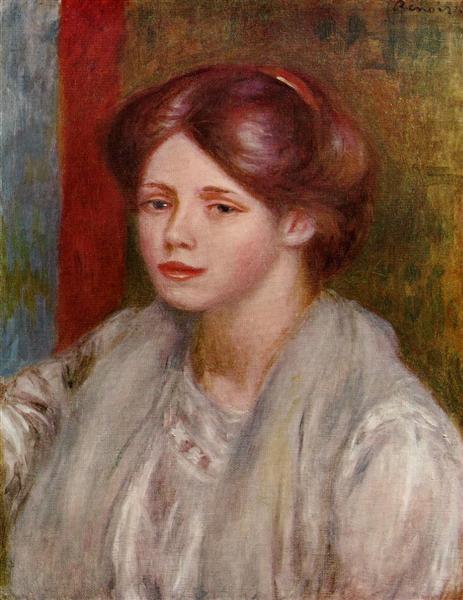Description
At the heart of Impressionism, Pierre-Auguste Renoir emerges as one of the masters who redefined portraiture and the depiction of the human figure in the context of modern art. His 1887 work “Portrait of a Young Woman” is a vibrant testament to his signature style, where light, color and form intertwine to capture not only the external appearance, but also the essence of the subject.
The composition of the work features a young woman who, with a serene expression, looks slightly to the side, offering the viewer a sense of intimacy and connection. The way Renoir uses space is noteworthy; the soft, diffuse background subtly contrasts with the central figure, allowing the eye to focus on the woman's expression and delicate features. This focus on the figure is representative of Renoir's style, where the portrait is not simply a representation of reality, but a celebration of individuality and beauty.
The use of colour in this painting is remarkable. Renoir opts for a soft palette of pastel tones, predominantly whites, pinks and blues that lend an almost ethereal luminescence to the figure. The light seems to flow naturally and warmly over the young woman's face, illuminating her cheeks and creating a beautiful contrast with her dark hair, which playfully frames her face. This attention to the treatment of light and colour is a hallmark of Impressionism, where Renoir, like many of his contemporaries, moved away from the rigidity of academicism in favour of a more emotional and sensorial representation.
The young woman's clothing is equally important in the painting, with the fabric of her dress providing a soft background and the darker details at the edges suggesting a rich texture, adding depth to the painting. Through this choice of colour and detail, Renoir manages to not only portray the woman, but also evoke an atmosphere that has as much to do with the fashion of the time as it does with the personality of his subject.
However, the historical and biographical context in which this work was made also contributes to its meaning. In the 1880s, Renoir was immersed in the exploration of the female figure, experimenting with themes of beauty and joy in everyday life. Portrait of a Young Woman aligns with this interest, presenting the woman not only as an object of desire, but as a human being with her own character and dignity. The elegance of the portrait and the perception of femininity, as well as the search for beauty in ephemeral moments, are aspects that resonate deeply in Renoir's work.
When looking at this work, one cannot miss the skillful technique of loose, short brushstrokes, which characterizes the way Renoir creates a sense of movement and life in the image. This approach suggests a close capture of the instant, a moment suspended in time that invites contemplation. Such a technique has been emulated by many later artists, who admire Renoir's ability to fuse the immediacy of visual experience with a deep emotional sensitivity.
"Portrait of a Young Woman" is not just a painting; it is an invitation to explore the connection between the viewer and art, a reflection on beauty and youth, and ultimately a wonderful example of Renoir's genius. Looking at this work, we can almost sense the story behind the woman's gaze, evoking a sense of nostalgia and admiration, which is what Renoir invites us to feel through his immortal art.
KUADROS ©, a famous painting on your wall.
Hand-made oil painting reproductions, with the quality of professional artists and the distinctive seal of KUADROS ©.
Painting reproduction service with satisfaction guarantee. If you are not completely satisfied with the replica of your painting, we will refund 100% of your money.

